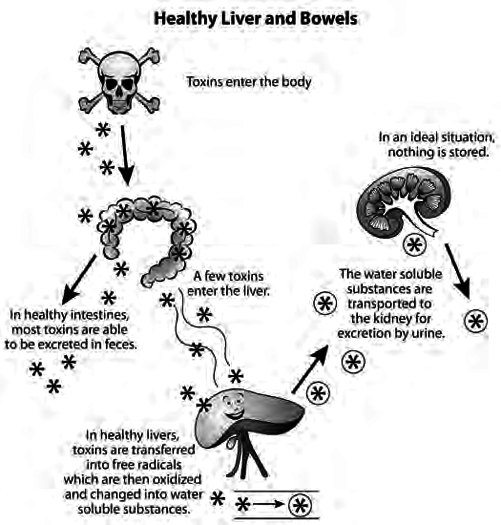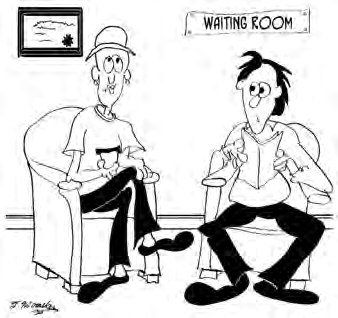100 Perks of Having Cancer: Plus 100 Health Tips for Surviving It (19 page)
Read 100 Perks of Having Cancer: Plus 100 Health Tips for Surviving It Online
Authors: Florence Strang
Tags: #Health; Fitness & Dieting, #Diseases & Physical Ailments, #Internal Medicine, #Oncology, #Cancer, #Medicine & Health Sciences, #Clinical, #Medical Books, #Alternative Medicine, #Medicine


Perk #14: I Didn’t Have to Worry About My Guests Finding a Hair in the Food I Prepared
69
●
drinks plenty of dechlorinated pure water
●
is conscious of toxins in the home
You can fix your intestines by fixing your diet and your
lifestyle. For example, eating a whole food plant-based diet
Don’t look to a detox
and meditating every day promotes healthy intestines,
kit for your answer to
which results in healthy pooping, which, in turn, results in
health. Instead, change
a healthier you!
your lifestyle and make
It’s a bit overwhelming when you realize you need to
long-term investments
change the habits you’ve grown accustomed to for many
you can bank on.
years, so you may be tempted to look for quick and easy
Remember, according
solutions in this category. But the real “health” will come
to the Tao proverb, the
from a lifestyle committed to clean, whole foods, adequate
longest journey begins
water intake, exercise, a relaxed mind, and avoiding chemi-
with a single step.
cals . . . not from an enema bag or a three-day “cleanse.”




Perk #15
I Got Fast-Tracked for Blood Work
I
would like to have a dollar for every minute I
have spent in hospital waiting rooms. We all
know how boring and time-consuming it is
waiting to have blood work and other routine
lab tests done. Before my diagnosis, I would sit
in the waiting room for hours, trying to look dig-
nified while holding a bottle of pee in my hand.
However, after I was diagnosed, I no longer had
to play the waiting game. At my hospital all I
needed to do was say, “I am a chemo patient,”
and I would get fast-tracked. I think the rationale
was that they didn’t want us chemo patients
hanging out with “sick people” since our immune systems were low. Hey,
it worked for me! I also had a special parking permit for chemo patients so
that I was guaranteed a parking spot close to the hospital.
Use your chemo status to your advantage. Find out if your hospital
will fast-track your routine lab tests, or give preferred parking.
If you are forced to wait, use your time wisely. Bring an inspirational
book to read, listen to your favorite tunes, or do a meditation.
HEALTH TIP #15
Even Ironman Needs Iron
A
s you’re watching the blood pour into that glass tube from your arm,
think about this: Your blood is pretty cool. Blood plasma is the river
that everything floats in; white blood cells attack germs; platelets help you
I 70 J
Perk #15: I Got Fast-Tracked for Blood Work
71
to form clots when you cut yourself; and red blood cells carry oxygen to every
cell of your body to support life. All of that is going on every day inside you.
The components of blood all work together to keep you going, but it’s
the red blood cells, in my humble opinion, that are the true “super cells.”
When red blood cells don’t work, it affects every system in your body.
Ane-
mia
is the term for “tired red blood cells.” What would make these super-
cells slump? Two reasons are chemotherapy and radiation, as chemo attacks
healthy red blood cells and radiation attacks the factory (bone marrow)
where the red blood cells are made. (Damn those treatments.) Luckily, once
the treatments are over, your anemia should continue to improve.
Another cause of anemia is low iron.
Iron is necessary for the production of the oxygen-carrying part of red
cells. Low iron equals low oxygen equals one tired and depressed person.
It is especially important for those undergoing treatment for cancer to eat
a balanced diet high in iron-rich foods to top off iron stores during and
after treatment.
And, um, no, I won’t tell you to eat liver.
The general population equates “meat” with “high-iron” foods. But iron
is present in countless numbers of fruits, vegetables, beans, nuts, and
legumes as well. In fact, one cup of oatmeal has more iron (10 milligrams
per cup) than three ounces of beef liver (7.5 milligrams).
Animal-based foods and plant-based foods have different kinds of iron.
Iron from animal sources is called heme iron while plant-based sources have
non-heme iron. They’re both iron, but heme iron is absorbed at a higher
percentage than non-heme, so you don’t need as much of it to meet the
daily requirements. That can be good
and
bad. Iron is recycled from old red
blood cells stored in your body, and it’s not excreted. Too much iron causes
oxidation leading to heart disease and cancer. One study showed that lung
cancer rates were 300 percent higher in red-meat eaters than abstainers, and
another study showed that 88 percent of metastasized breast cancer patients
had elevated iron levels. In today’s society we are seeing more iron
overload
issues than iron deficiencies among meat eaters. Symptoms of high iron can
include heart palpitations, joint pain, and fatigue.
Plant-based foods, on the other hand, contain non-heme iron. Less of
the iron you eat is absorbed, but if you are eating a well-balanced five
72
100 Perks of Having Cancer
fruit/veggie serving a day, you will get all of your iron without the
Including iron-
iron overload. You can also increase your absorption of nonheme
rich plant-based
iron by cooking in cast-iron pots and pans and including foods
foods can keep
high in vitamin C like citrus, berries, and peppers with the meal.
you healthy and
Yes, throw some mandarin oranges and red peppers (high vitamin
your blood
C) into your spinach salad (high iron) to kick-start the iron absorp-
happy.
tion! Just for fun, here’s a comparison of iron contents from ani-
mal- and plant-based sources:
Animal sources:
3 ounces of beef tenderloin = 3 milligrams of iron
3 ounces of chicken breast = 1.1 milligrams of iron
Plant-based sources:
1 cup boiled black beans = 3.6 milligrams of iron
1 cup lentils = 6.6 milligrams of iron
1 cup cooked spinach = 5 milligrams of iron
2 ounces pumpkin seeds = 8.4 milligrams of iron
I could go on for days. . . .
The daily requirement of iron for women not pregnant or lactating is
18 milligrams per day. Over age fifty-one? Cut that in half as older folks (I
said
old-er
. . . not
old
) don’t excrete iron as fast as youngsters do.
Some other foods that will help you keep your stores at the proper level
are dandelions, almonds, whole-grain bread, peas, all beans, kale, apricots,
dates, and many more.
Note: Don’t ever take iron pills or vitamins containing iron unless you
have had your blood levels checked for deficiency. Extra iron in pill form
is not extra healthy.


